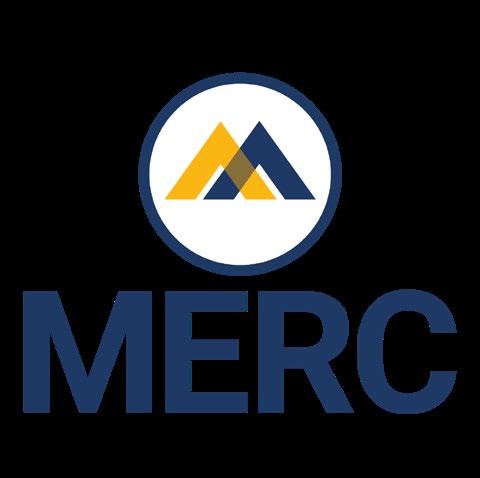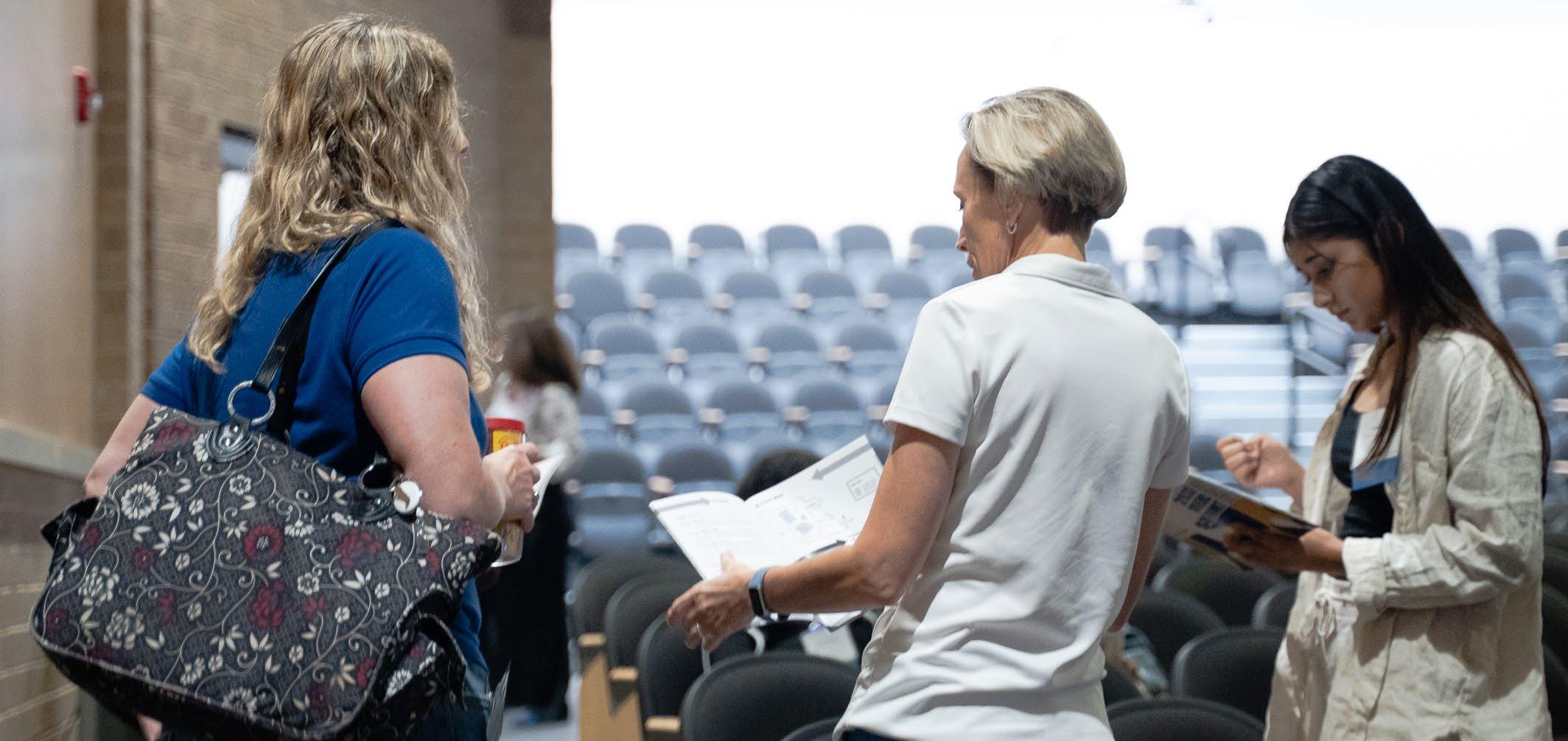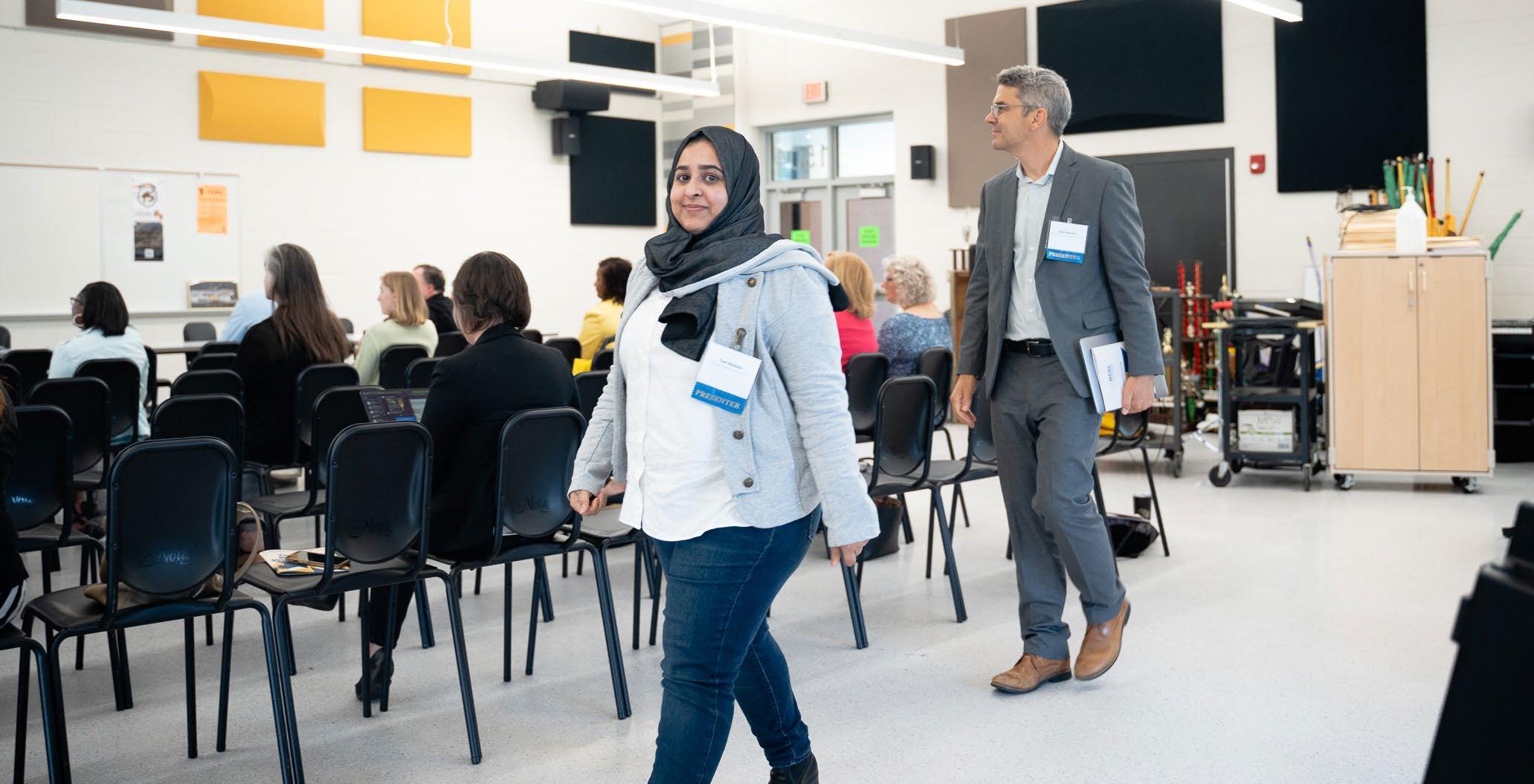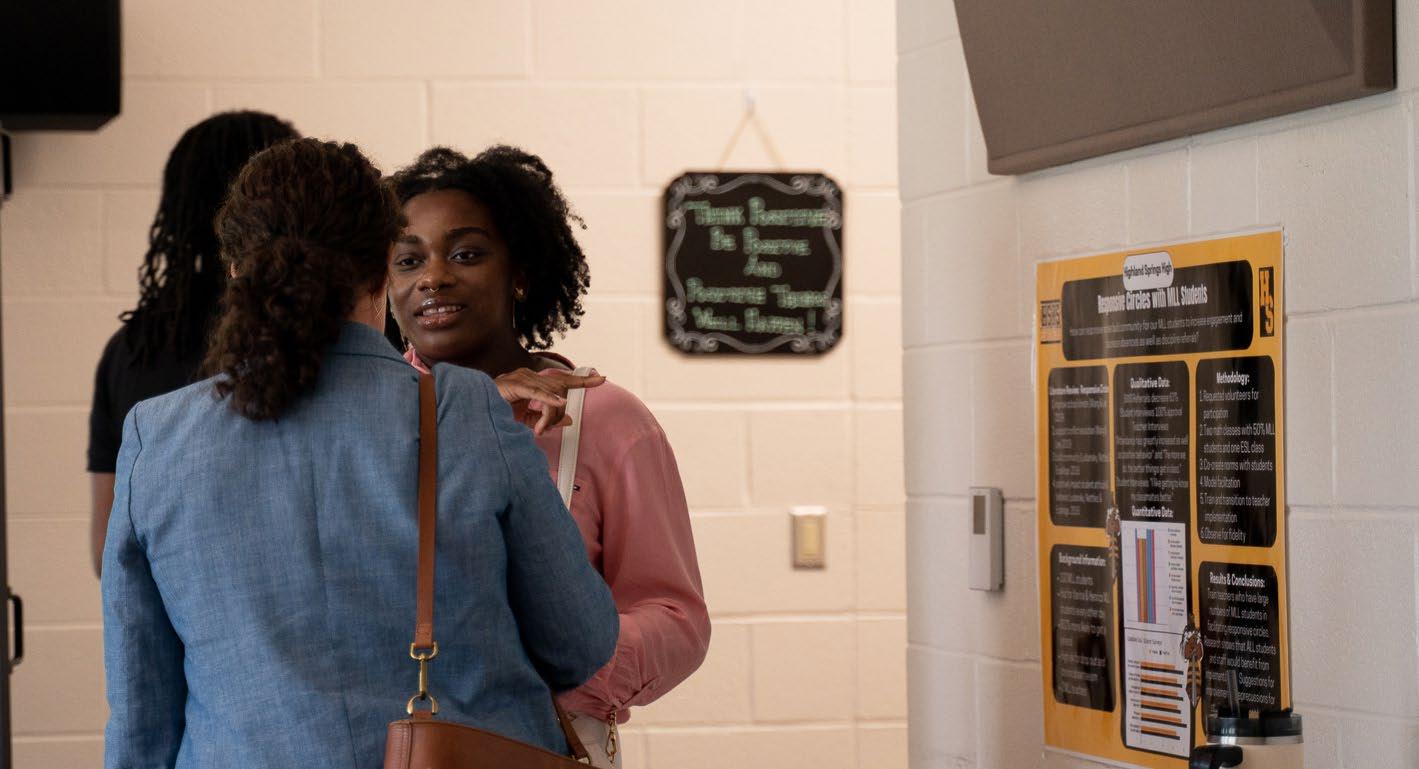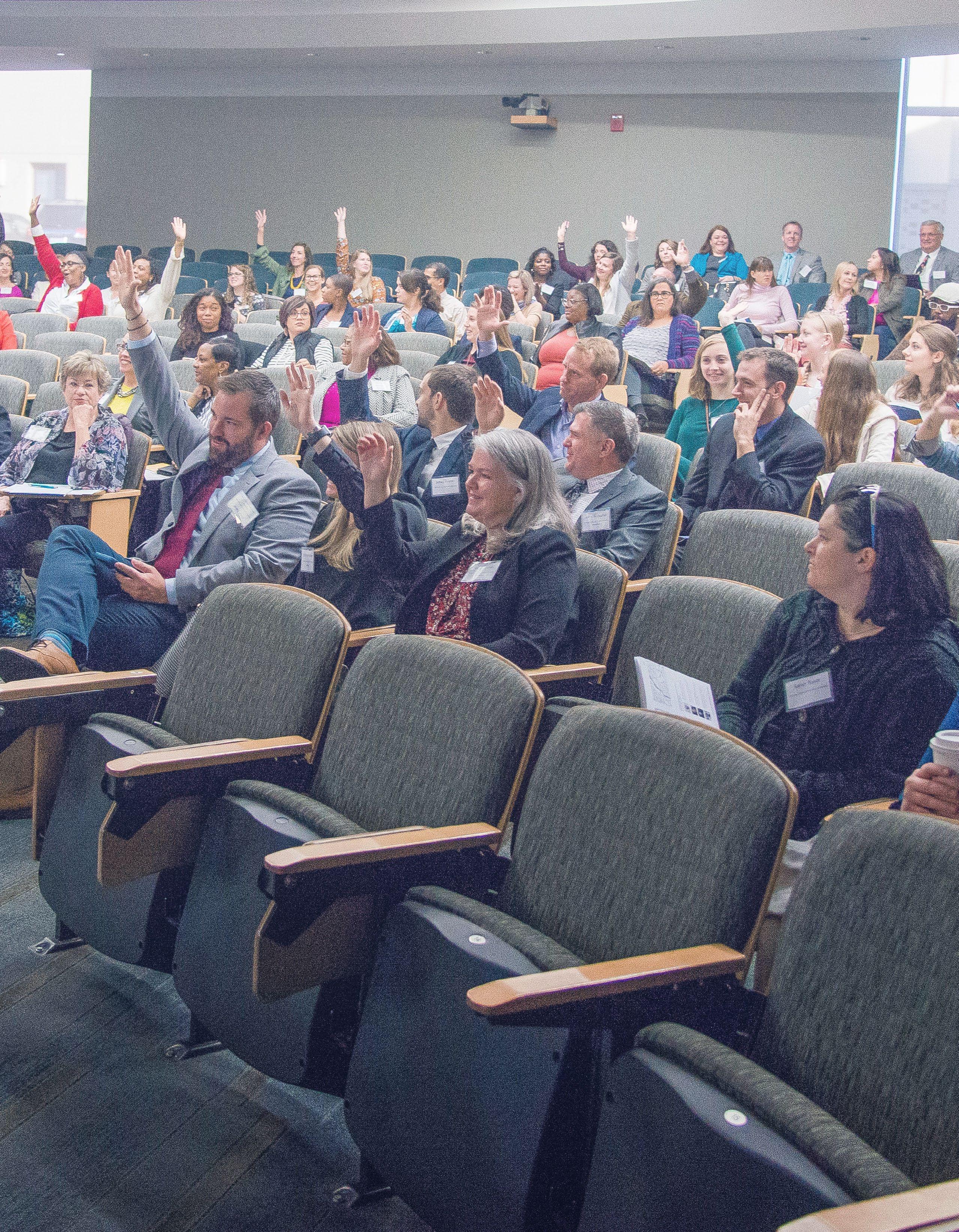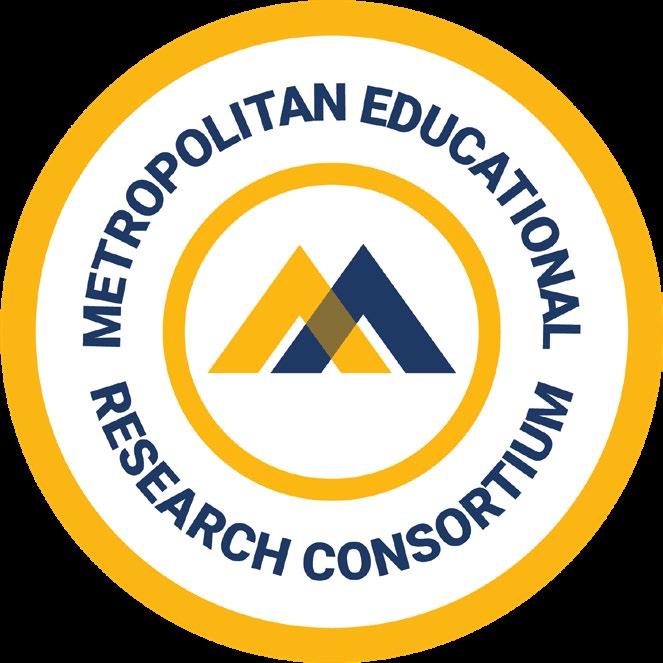






Research-practice partnerships in education (like MERC) are long standing collaborations intended to help PK-12 school systems address enduring and emerging issues through the use of data and evidence-based strategies. The Metropolitan Educational Research Consortium (MERC) just completed its 32nd year of existence, and even with that longevity it has been necessary for us to continuously adapt our practices within the shifting landscape of public education while prioritizing the nurturing of strong relationships with our partners. Public schools continue to be prominently featured in news stories and political campaigns, particularly in the wake of COVID-19, and as they have come out of the pandemic they have had to navigate rising chronic absenteeism, compounding challenges with academic performance (including enduring achievement disparities in relation to student race and socioeconomic status), difculties with the recruitment and retention of faculty and staf, and enduring needs related to supporting mental health in schools. At the same time, dedicated educators and leaders in PK-12 settings have persevered through rapid shifts in the sociopolitical contexts surrounding their work while seeking partnerships and evidence that help them serve their students better. We know that to be true, because we work with them every day.
The 2023-2024 academic year for MERC was one characterized by rigorous, collaborative research, exploration & expansion of strategies for sharing what we learned to promote research use in PK-12 settings, intentional engagement at the state and national level to inform our work and contribute to broader conversations, and the launching of a new institute to serve
the needs of diverse stakeholders inside and outside of the MERC partnership while simultaneously strengthening its infrastructure. In addition to continuing our work on MERC research studies focused on enduring topics pertinent to public schools, we have accelerated our eforts in producing research and policy briefs that respond to the real-time needs of our school divisions, and hosted podcast episodes, seminars, and an annual stakeholder Summit that broker conversations around research, policy, and practice while providing professional learning opportunities to PK-12 and higher education partners alike. We have engaged in new outreach initiatives at the local and state level, while working to position ourselves as a thought leader at the national level on processes within research-practice partnerships. While our mission has not changed, our methods for accomplishing it have evolved while remaining true to our guiding principles: relationships, relevance, rigor, multiple perspectives, and impact.
This annual report ofers an overview of MERC’s research eforts over the past academic year. It is organized according to our guiding principles to help illustrate the diferent ways that we approach and position our work to maximize its potential benefits to our partners. Vignettes ofered throughout the report are supported by evidence from a number of sources, including the annual MERC stakeholder survey, which was ofered to approximately 400 people who were actively engaged with MERC over the past year, either as a participant in our research or an attendee at one of our events (n = 77 total responses, including 40 from PK-12 and 32 from VCU). It also includes evidence from various
DAVID NAFF, PhD MERC Directorother surveys throughout the year where we have invited stakeholders to weigh in on their experiences with our seminars (n = 86 responses), Summit (n = 107 responses), and co-curricular opportunities (n = 9 responses). Additionally, it includes feedback we have solicited from readers of our reports and users of our online dashboards about how they plan on using these resources to inform their work, as well as evidence related to report downloads, website visits, podcast plays, seminar registrations, and other metrics indicating how people have interacted with MERC research and resources over the past academic year.

We are immeasurably grateful to our partners in Chesterfield, Goochland, Hanover, Henrico, and Richmond Public Schools, as well as the School of Education at Virginia Commonwealth University and our growing list of local, state, and national collaborators. It is our hope that this annual report helps to illustrate the multitude of ways that MERC works to connect with, and ultimately impact, our community.
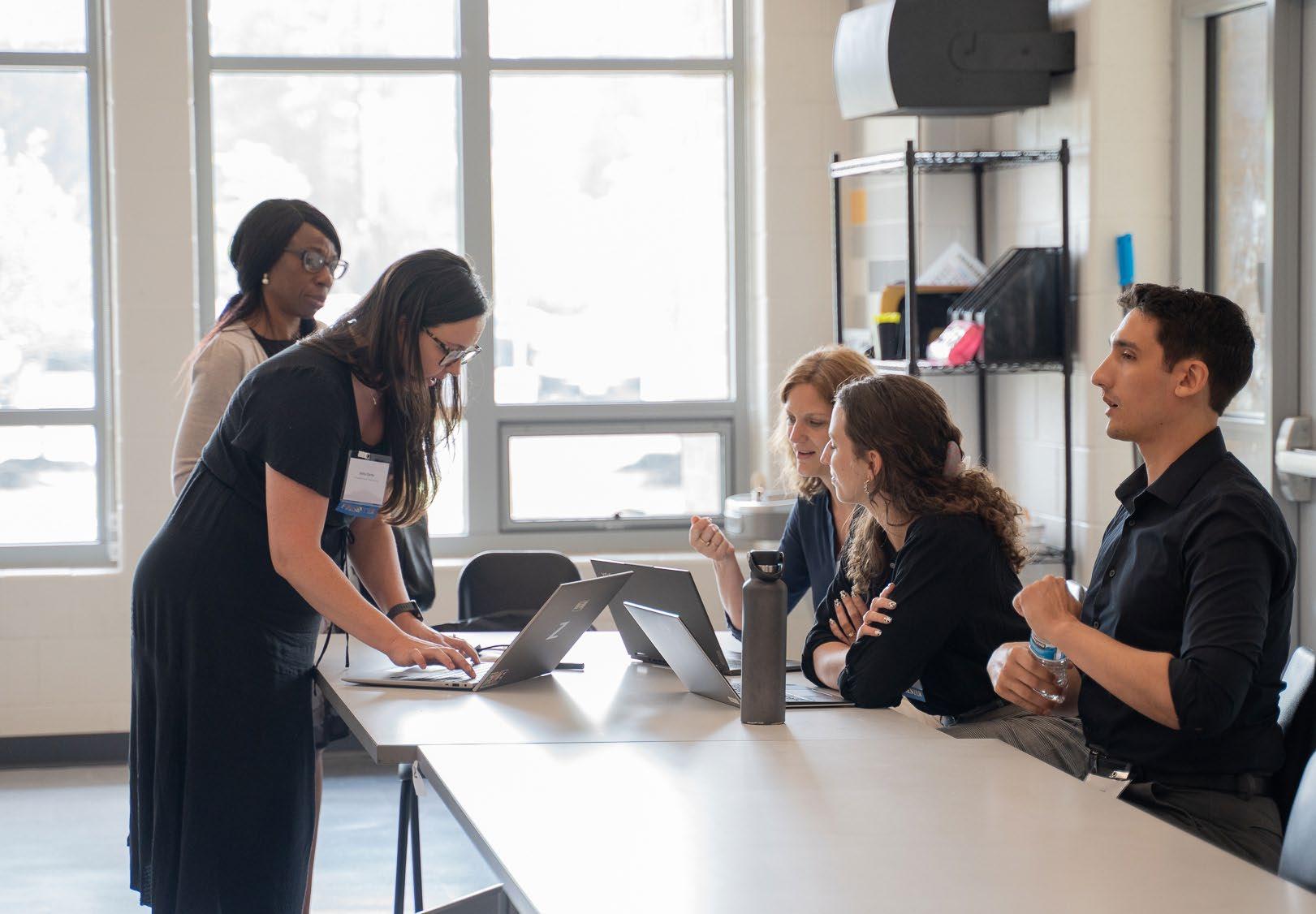
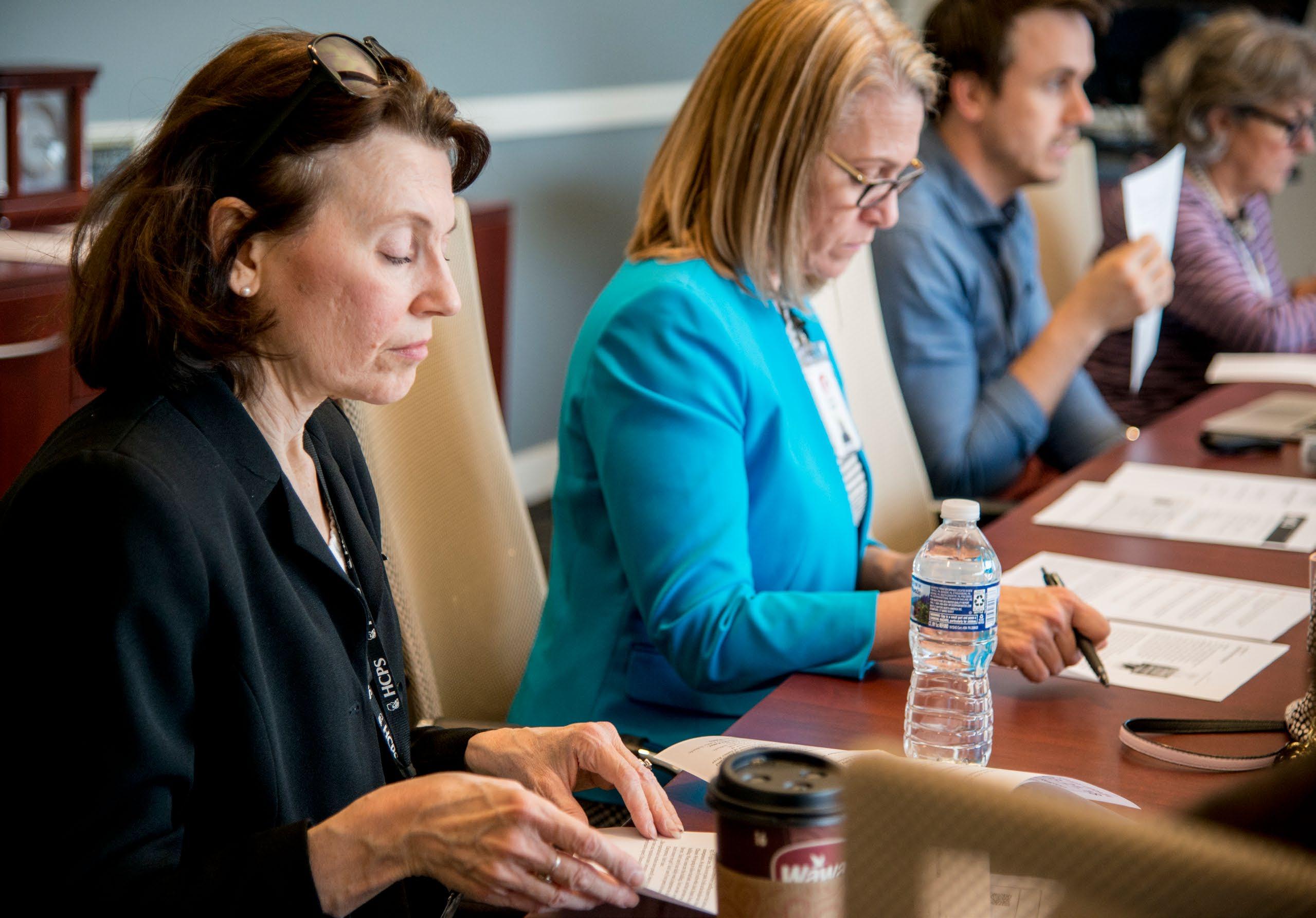
Learn more about one of the first education research-practice partnerships in the US
Chesterfield County Public Schools
Goochland County Public Schools
Hanover County Public Schools
Henrico County Public Schools
Richmond Public Schools
Established in 1991 as a partnership between Richmond-area school divisions and Virginia Commonwealth University’s School of Education, the Metropolitan Educational Research Consortium leads research that addresses enduring and emerging issues in PK12 education with the goal of informing policy, building the professional knowledge and skills of key stakeholders, contributing to the body of scholarly knowledge, and ultimately impacting outcomes relevant to students, schools, and communities.

RELEVANCE:
Our work addresses topics in ways that are relevant to those engaged in PK12 policymaking and practice.
IMPACT:
The knowledge generated through our work is focused on its use and impact on policy and practice.
RIGOR:
Our work is conducted in ways that reflect rigor and quality in design and implementation.
MULTIPLE PERSPECTIVES:
The relevance, impact, and rigor of our work is enhanced by engaging stakeholders that represent a range of experiences, perspectives, and knowledge bases.
RELATIONSHIPS:
The strength of our partnership relies on strong relationships between individuals, organizations, and communities that are characterized by communication & trust.
Quick-turn MERC resources helped school divisions respond to immediate needs throughout the school year
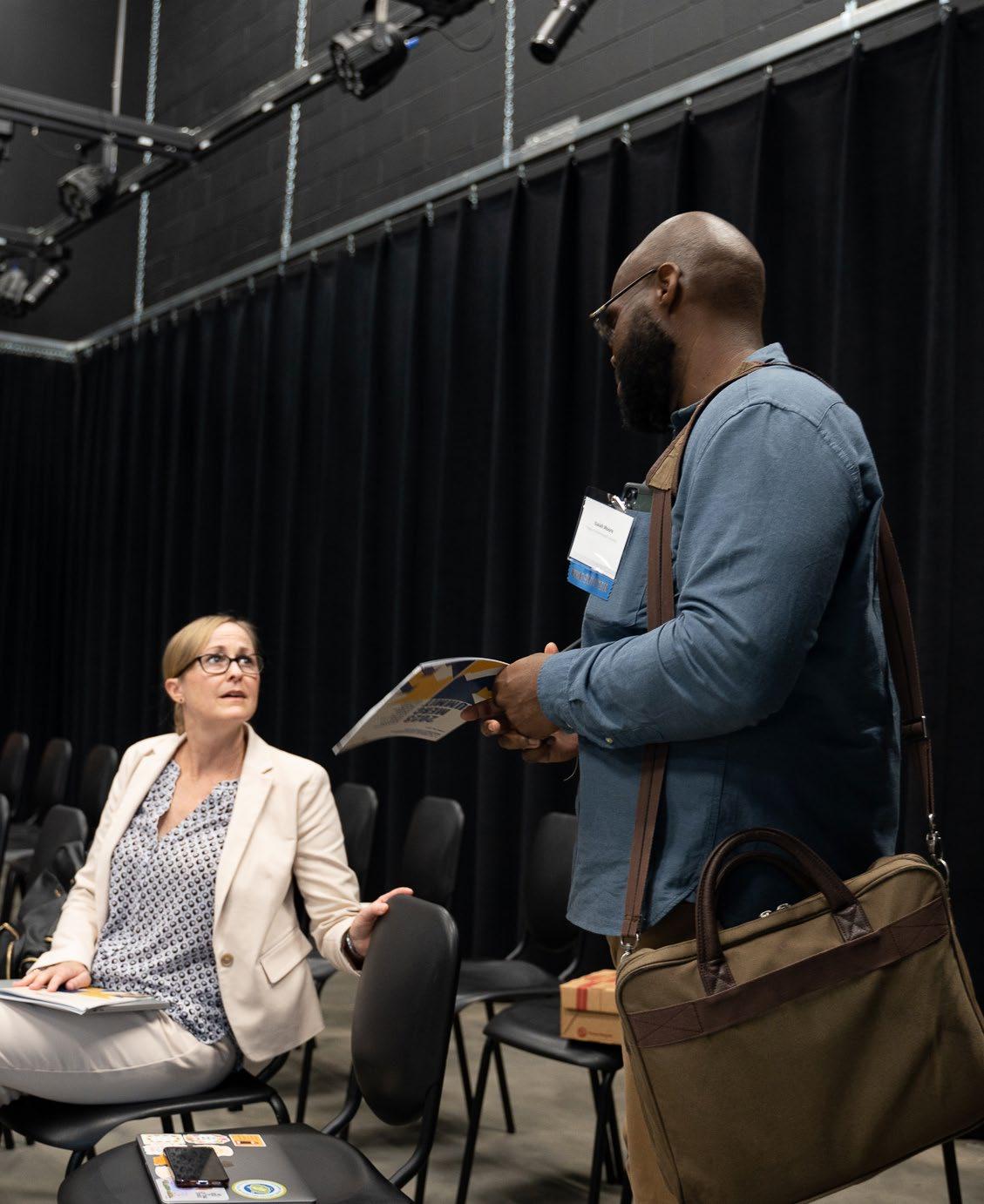
I
of PK-12 and VCU partners agree or strongly agree that MERC conducts research on topics that are relevant to those working within PK12 schools.
downloads of MERC research and policy briefs published last academic year
1,521 48
VCU students engaged as coauthors of MERC research and policy briefs last academic year
think the quick-turnaround research briefs have been great. I realize it's diffcult to do thorough, rigorous work quickly, but I imagine these are the types of resources that get the most use in school divisions.
- Central Offce Leader
A key outcome of MERC’s strategic planning eforts in 2022 was the recommendation by member divisions to produce research and policy briefs that are responsive to real-time needs. MERC studies are commissioned by consensus decision from school divisions to explore enduring issues over a sustained period of time, often multiple consecutive school years. MERC research and policy briefs can be commissioned by a single school division, and take an average of six to eight weeks to publish and disseminate. Often, they are accompanied by a MERC podcast episode or seminar to help summarize the key findings and highlight related work in the region.
In the past academic year, MERC published four research and policy briefs, with at least two more scheduled to be completed by the end of June, 2024. This built of of MERC launching this initiative in the 2022-2023 academic year, in which it published five briefs. The briefs published in 2023-2024 focused on strategies for addressing chronic absenteeism in the post-pandemic era, administrator feedback to teachers, adolescent THC usage in Virginia, and emerging issues and innovations in public PK-12 education (with a focus on implications for strategic planning). Altogether, these briefs had 1,521 downloads this academic year, with the topic of chronic absenteeism prevention being most popular at 802 downloads. There were 48 VCU students (primarily PhD or EdD) who served as co-authors on these briefs, engaging in methods including literature review, analysis of publicly available data, policy analysis, document analysis (e.g. strategic plans), and Google Trend analysis. The average number of students working on each project was approximately 10. Often, MERC research and policy briefs led to either podcast episodes, or seminars, and at least three briefs published in the 2023-2024 academic year will serve as the research foundation for the MERC Back to School Seminar Series at the start of the upcoming academic year.
MERC stakeholders shared how MERC research briefs provided timely information on relevant topics to help inform their work in the past academic year. Said one school board member, “MERC has helped me remain current on research related to many of the questions we wrestle with where improving student outcomes is concerned. It has been nice to know that the MERC team is here to help.” Said one teacher, “MERC does a good job of finding relevant topics and making the information available to the public education stakeholders.” MERC research and policy briefs also proved to be easy to distribute within PK-12 school systems, as one central ofce leader shared, “I send weekly communication to my team. I've linked in information shared by MERC and also directed staf to the website when relevant.” Said another, “I'll often cite MERC work in internal reports and presentations, and I also try to forward research papers and/or seminar invitations to colleagues that might be interested.” One reader of the MERC research brief focused on emerging issues and innovations in public education shared “(I) will use this to inform our advocacy at the state level. Being able to interpret some of the local school level strategic plans with this lens will be helpful.” Adding, “We are also doing the community meeting work of participating in strategic planning…and I feel like we are missing the data driven boat. This reminds me to focus on the district level and be specific in our goals.”
Although MERC will continue to engage in indepth research studies that are commissioned by consensus decision by partnering divisions, it will also prioritize the continued production of research and policy briefs that respond to real-time needs of school divisions. As demonstrated over the past two academic years, these briefs not only provide the opportunity for synthesizing and sharing relevant research in PK-12 settings, but also engaging with VCU students as co-authors and leading community conversations on pertinent topics in public education through seminars and podcast episodes.
MERC researchers partnered with school division leaders and practitioners to generate research and resources on this emerging technology
Over the last year, MERC led conversations about the integration of artificial intelligence (AI) into K-12 public schools. This began early in 2023 with the initiation of the AI in Education Learning Group, which brought together diverse perspectives to consider the implications of AI for public education. Initially led by Jesse Senechal, Executive Director of the Institute for Collaborative Research and Evaluation, this group included faculty and graduate students from across VCU in fields such as public policy, computer science, educational leadership, and art education; as well as representatives from MERC school divisions, including Eric Ekholm, Educational Data Specialist from Chesterfield County Public Schools, and Matt Caratachea, Coordinator of Technology Integration & Innovation, from Goochland County Public Schools. Multiple initiatives emerged from this efort that are relevant to the MERC partnership.
First, the AI in Education Learning Group engaged in writing projects to support local and state dialogue on the topic. With a focus on a form of generative AI known as Large Language Models (LLMs), the group published a research brief titled Balancing the Benefits and Risks of AI Large Language Models in K12 Public Schools which answered critical questions about LLMs and their implications for teaching and learning, concerns for use within public schools, and recommendations for educators and educational leaders. This brief led to a MERC seminar on this topic, which aimed to provide participants with a better understanding of how LLMs work, discuss potential uses of LLMs to support student learning and the work of teachers, raise awareness about the risks associated with the use of LLMs in schools, and encourage consideration of factors relevant to developing K-12 policies related to LLMs.
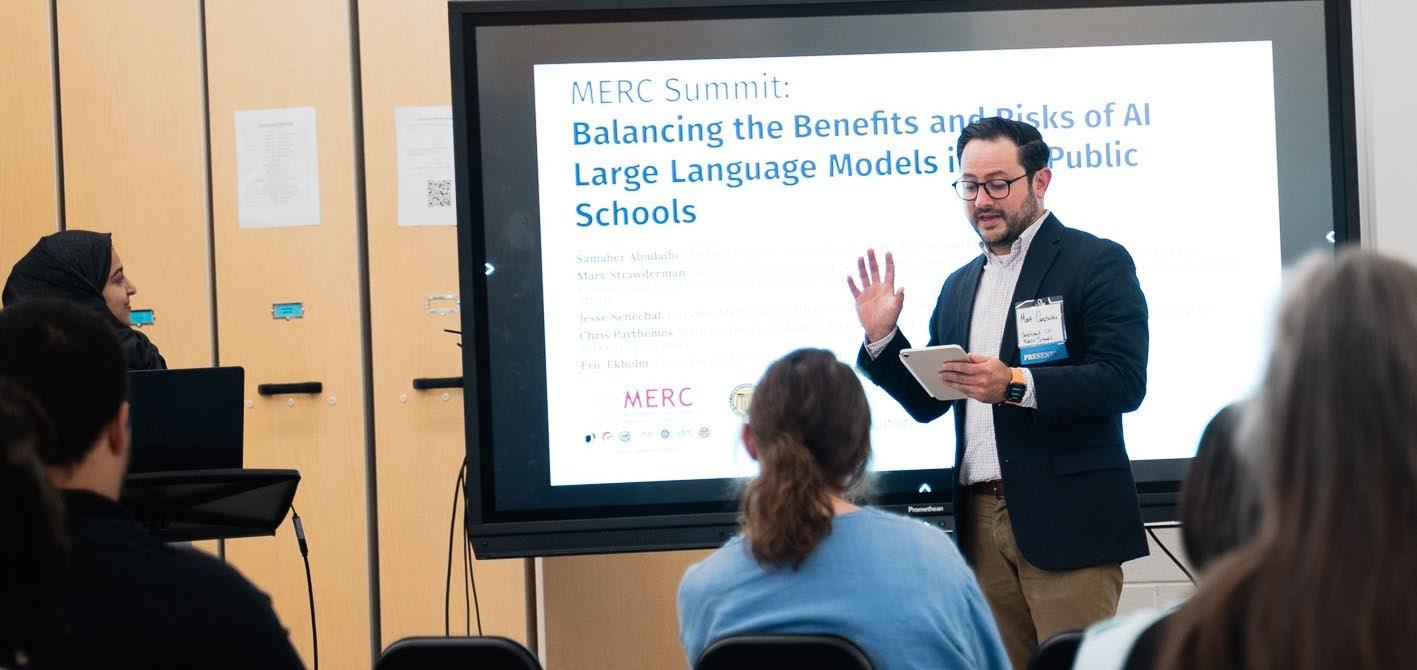
123
REGISTRANTS for the MERC seminar on AI
1,935
downloads of the MERC research and policy brief focused on AI in the past year
The group also published an article in the Virginia Education Association Journal titled Artificial Intelligence in School: Five Questions Educators Should be Asking which reached educators across the state of Virginia. The article emphasized the importance of educators (especially teachers) developing a professional perspective on AI in education and encouraging them to participate in the broader conversation about the use of AI in K-12 schools with policy makers and educational leaders.
In addition, the AI in Education Learning Group applied for, and was awarded, a Fund for Excellence and Innovation grant from the State Council of Higher Education of Virginia (SCHEV) aimed at preparing secondary school teachers to integrate AI into their curricula and help students understand AI's implications for future careers. Led by Jon Becker from the Department of Educational Leadership at VCU, the grant will support a professional development experience for 20 teachers from Goochland and Henrico County Public Schools, representing multiple disciplines where AI is likely to have a significant impact. The experience will include workshops, collaboration with VCU faculty experts, and the design of high-quality work-based learning experiences for students.
As AI rapidly evolves, MERC remains committed to leading conversations and initiatives that help educators and educational leaders navigate the benefits and risks of AI in K-12 education. The work of the AI in Education Learning Group in 2023 laid a strong foundation for ongoing collaboration and dialogue on this critical topic.
The educational resources for AI were very helpful to kickstart my engagement. - VCU Faculty/Staff Member
MERC collaborated with dozens of students on its studies last school year

of surveyed co-curricular students indicated that they gained valuable research and career-oriented skills, and were able to connect with colleagues inside and outside of their discipline
In the 2023-2024 academic year, MERC engaged in a variety of research and evaluation projects that involved several diferent research methodologies, including literature reviews, survey design and analysis, secondary data analysis, policy analysis, and qualitative thematic analysis (among others). Because MERC is situated within the VCU School of Education, it is also positioned to ofer real-world learning opportunities to students who are interested in public education, educational research, and research-practice partnerships. In the previous academic year, there were 45 doctoral students who engaged in MERC projects in a co-curricular capacity, including 16 EdD and 29 PhD students across 10 diferent academic tracks. Of those students, nine participated in more than one project and 13 participated in a MERC project for a second consecutive academic year.
Additionally, MERC supported three doctoral students from three diferent academic disciplines through their externship requirements. MERC also launched a new Vertically Integrated Project (VIP) connected with its Supporting Mental Health in Schools study that connected three undergraduate, two masters, and four doctoral students on collaborative research projects focused on informing local PK-12 policy and practice. MERC also supported four federal work-study undergraduate students on its projects, two of whom were returning from the previous academic year. Participating students were routinely listed as co-authors on MERC research reports and briefs.
VCU doctoral, masters, and undergraduate students participated in MERC projects last year
of surveyed co-curricular students would recommend a MERC co-curricular to a colleague or classmate
85.2%
of VCU partners indicated that the knowledge they have developed through their engagement with MERC research has informed their professional practice
of VCU partners indicated that they expanded their professional connections through MERC 88.9%
My experience with MERC has been an unexpected surprise. I wanted to increase my skill set but was pleasantly surprised when I found out I became a published co-author and my confdence level increased.
Thank you!
Participating students shared about how their involvement with MERC research helped increase their content knowledge related to subjects relevant to PK-12 public education (e.g chronic absenteeism or mental health) as well as their self-efcacy for conducting research. Said one participating student, “…serving on one of the MERC evaluation teams has provided an opportunity to practice analysis skills and apply it more confidently to various topics reviewing in class. Volunteering is an opportunity to practice skills learned in the classroom in a safe environment.” Said another, “MERC has been a tremendous experience for me professionally and personally. It helped me better prepare for my Capstone, and it grew my confidence as a researcher and writer.” Students shared about how they appreciated the opportunity for realworld learning through MERC projects, “They have greatly increased my skillset and understanding of diferent research and evaluation methods in an applied way, versus learning for coursework.”
Students also reflected on how their involvement with MERC projects helped them better understand the needs of local school divisions. As one student shared, “The co-curricular activities have expanded my knowledge of k-12 educational challenges and hot topics as well as enhanced my research knowledge and skills. I have worked with amazing educators and fellow students.” Said another, “I am particularly interested in evaluation work, so being able to participate on multiple MERC projects has helped me build my skillsets and learn about issues concerning school districts in the area.” Students expressed how their engagement with MERC research and evaluation projects helped them make new connections within and outside of their disciplines while learning more about research-practice partnership work, said one student “I grow as a professional and researcher every year through my engagement with MERC. I appreciate this opportunity and team.”
Stakeholders described how they used MERC research to inform their practice and how they shared it with colleagues in the last school year
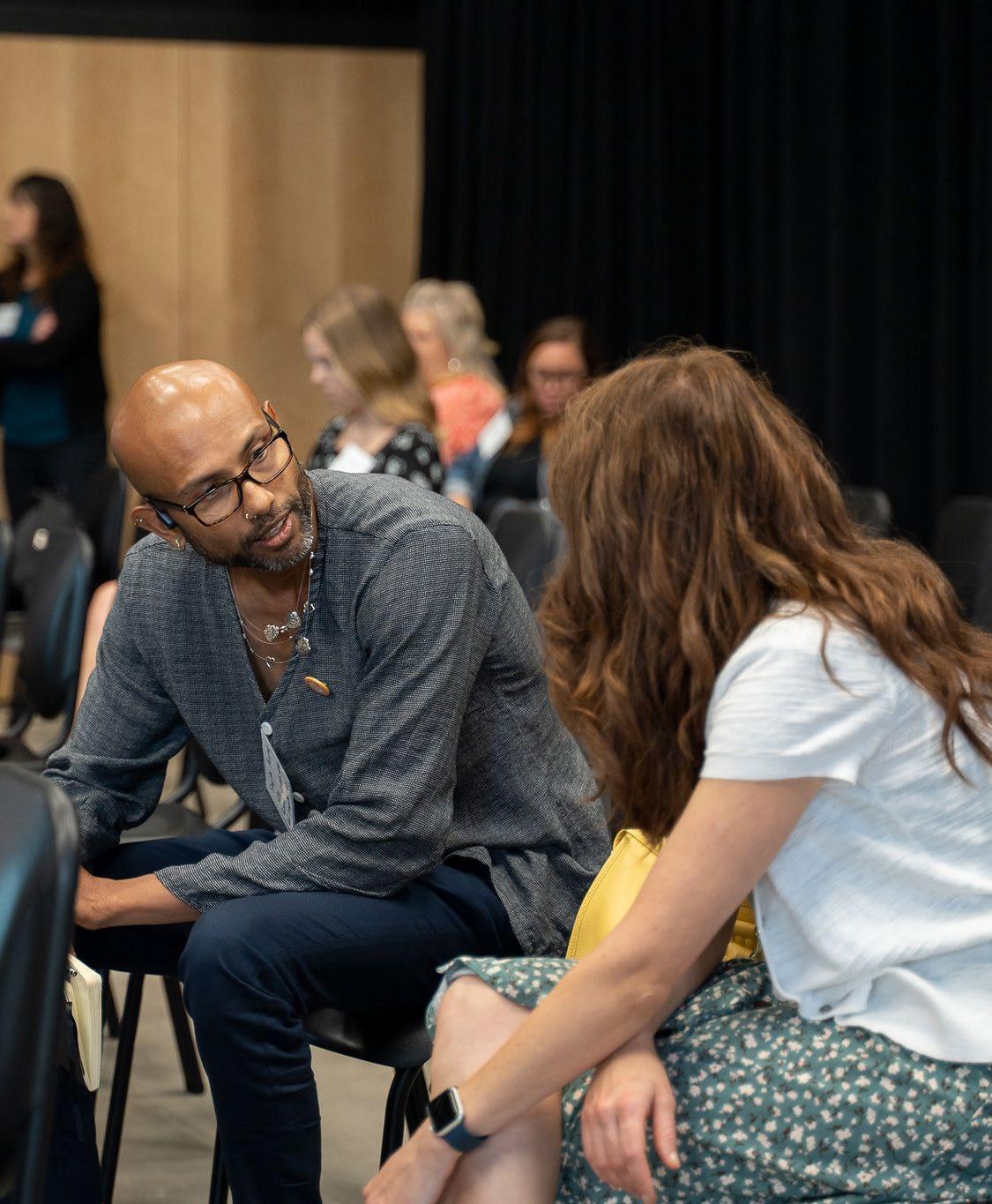
I am grateful.
- School Board Member
74.1%
of survey respondents from MERC divisions agreed or strongly agreed that the knowledge they developed through their engagement with MERC research has informed their professional practice
MERC conducts an annual survey with its stakeholders who were actively involved with the partnership in the previous academic year. While this includes individuals from various sectors across the Commonwealth of Virginia, the primary respondents come from VCU and the MERC school divisions. This year, 40 partners in MERC divisions responded to the survey and shared about their experiences participating on a research or evaluation team, attending a seminar or the annual MERC summit, serving on the Policy and Planning or Steering Committee, or otherwise being directly involved with MERC (e.g. participating in a podcast episode). They described how they accessed, shared, and used MERC research to inform their professional practice.
MERC partners described how they used MERC research to inform conversations with colleagues on pertinent topics in public PK-12 education. Said one school board member, “I have used MERC research to ofer perspective and context when discussing topics/issues with my colleagues and with school leadership.” Said one school-based mental health provider, “During meetings, I have shared the information presented through MERC, which has helped to direct our decisions within the schools.” In fact, 87% of school division partners indicated that they had shared MERC research with colleagues over the past academic year. Partners also shared how they used MERC research to provide a research foundation for their practice, as one central ofce leader explained “It has allowed me to make connections and learn more about the research that is available on topics relevant to my work.” Said another central ofce leader:
of seminar attendees indicated that they were likely to share what they learned
of survey respondents from MERC divisions indicated that they shared MERC research with a colleague over the past academic year 97.0% 87.0%
MERC's research efforts have helped to directly inform my work at the division-level. I have been able to take the information and data provided by MERC to infuence decisions that I make in my position as well as share relevant research with colleagues. Engagement with MERC has also been an impactful way to connect with colleagues across the Richmond area.
- Central Offce Leader
MERC research is an invaluable first stop for me when beginning projects. I’ll typically use it to better understand the literature on a given topic (or the regional data trends, if those are relevant to the project). From there, I’ll often build on this foundation with my own work to address niches or areas of interest not covered by the MERC resources.
MERC research also proved helpful for professional development. Said one school quality specialist, “I used the research as part of attendance professional learning sessions for school based teams and administrators to support best practices and recommendations for improvement plans.” Much of MERC’s professional development eforts have come in the form of seminars. Attendee evaluations included statements indicating how they plan on using the information that they learned, either to inform their own practice or share with their colleagues. Said one attendee from the MERC seminar on chronic absenteeism, “I already took some of the strategies to my chronic absenteeism intervention team and we’re going to try to begin talking about them at our next staf meeting.” Said another attendee at the MERC seminar on bullying prevention, “I plan to advocate to my administration to incorporate more restorative practices and family engagement events into our school to improve the climate. Also to educate students, parents, and staf about the definition of bullying.” The MERC seminar on suicide prevention policies also proved impactful, as one attendee shared, “I plan to implement the methods of identifying and preventing suicidal ideations in adolescents daily. I have already begun to embed social and emotional check-ins with my students to encourage them to share how they are feeling beyond the surface.” Overall, 97% of MERC seminar attendees indicated that they are likely to share what they learned.
Overall, it was clear that MERC school division partners found MERC’s research to be impactful on their work, and that they were likely to share it with colleagues to similarly inform theirs.
In the 2023-2024 academic year, MERC had:
of MERC publications, with 8 new research and policy briefs published open-access
of the MERC podcast Abstract, with four new episodes released featuring 14 guests from MERC divisions, VCU, and state organizations 14K 2K
interacting with MERC dashboards and websites
16K 214 105
at the MERC Summit, featuring 41 presenters from MERC divisions, 41 presenters from VCU, and 24 presenters from other organizations
engaged in MERC studies, including VCU faculty, staf, and students, and PK-12 partners in MERC divisions
of stakeholders1 using MERC research to build their professional learning on a topic relevant to public education 321 75%
across 4 seminars, featuring MERC research as well as guests from MERC divisions, VCU, and state, civic, and nonprofit organizations
of stakeholders discussing MERC research with a colleague
of stakeholders using MERC research to inform conversations within their team, department or unit 64%
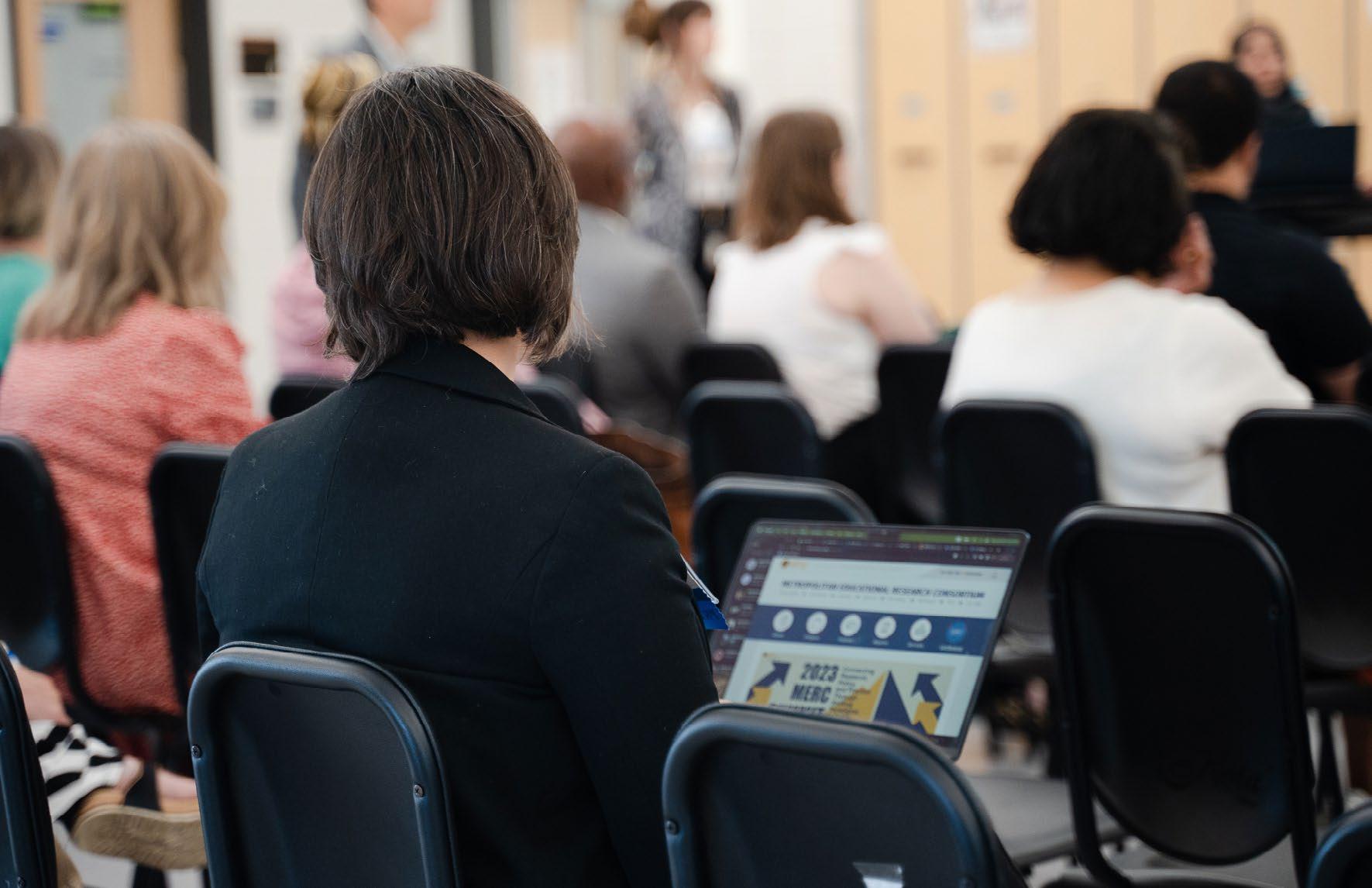
In the fall of 2023, MERC published a research and policy brief entitled Emerging issues and innovations in public PK-12 education: Implications for strategic planning. The brief included a review of research literature published since 2021 focused on how PK-12 school districts engage in strategic planning, as well as an analysis of strategic plans across Virginia and in some of the largest school districts in the country. It also included an analysis of Google trends related to the most pressing issues in public schools, including school safety, learning loss, mental health, teacher shortages, and more. Concurrently, Richmond Public Schools was working on updating their five year strategic plan entitled Dreams4RPS. RPS Director of Advocacy and Outreach Matthew Stanley connected with MERC Director David Naf to ask how MERC might be able to partner with the division to provide a research foundation for its strategic planning eforts in collaboration with their local stakeholders. The RPS team already had an expansive calendar planned for community outreach and input, and MERC was eager to plug into those eforts.
Initially, MERC joined a Dreams4RPS meeting at Richmond Community High School on December 11th, 2023. At that meeting, MERC personnel presented an overview of trends in public education over the past five years, ofering a framework for subsequent discussions with attendees about what RPS should consider when planning for the next five years. RPS leadership also distributed copies of the recent MERC research and policy brief to attendees to help inform
MERC provided analyses and input on the next iteration of Dreams4RPS

their recommendations that evening. Said one RPS parent in attendance that evening about the report, “Being able to interpret some of the local school level strategic plans with this lens was helpful. I feel like we (are often) missing the data driven boat. This reminds me to focus on the district level and be specific in our goals.” MERC also actively engaged in discussions with stakeholders that evening, “dreaming” together about the future of Richmond Public Schools.
Following that meeting, key takeaways from the MERC research and policy brief were included in subsequent presentations by RPS leadership to its stakeholders engaging in strategic planning discussions. MERC personnel also presented to the RPS School Board during an update about strategic planning eforts in the division on January 8th, 2024. Additionally, MERC was an active participant in two Dreams4RPS community leader round table discussions with local civic and higher education leaders in March. Moving forward, MERC will continue to be at the table as RPS leadership synthesizes community input into their strategic plan for 2024-2029, and in subsequent data collection and analysis to understand how their stakeholders perceive their progress on their goals and priorities.
RPS is grateful to MERC and their support with the strategic planning process and researching strategic plans for school divisions. Thanks to this partnership, we know that we are on the right track in developing a new, comprehensive strategic plan that will help us navigate the most critical issues in public education. We are excited to continue to partner with MERC by working collaboratively to conduct stakeholder surveys of our families, staff, and students that are aligned to the goals of our forthcoming new plan.
- Matthew Stanley, RPS Director of Advocacy & OutreachAlthough the project had a local focus, MERC shared its approach with state-level partners

A key component of MERC’s Equitable Access and Support for Advanced Coursework study was to establish a foundational understanding of what student participation in advanced coursework looks like in the region, including how it varies by student demographics across PK-12 education. To accomplish this, MERC leveraged the Virginia Longitudinal Data System (VLDS), a resource curating de-identified data from multiple state agencies across Virginia to help researchers explore pertinent topics related to public sectors, including education. Partnering with Chin-Chih Chen, Associate Professor in Counseling and Special Education in the VCU School of Education, MERC formed a team of
doctoral students to identify relevant data points related to advanced coursework participation in the MERC region and access the data through VLDS. After cleaning and analyzing the data, the MERC team produced a regional report that summarized how participation in elementary gifted programs, middle school Algebra I, and high school Advanced Placement (AP) varied by students’ gender, disability status, race, ethnicity, and multilingual learner status. That report concluded with a series of implications and recommendations written by leaders of advanced coursework in MERC school divisions who participated on the study team. Additionally, the MERC team produced a companion dashboard that allowed users to interact with the data from the report and use it to ask and answer their own questions about advanced coursework participation.
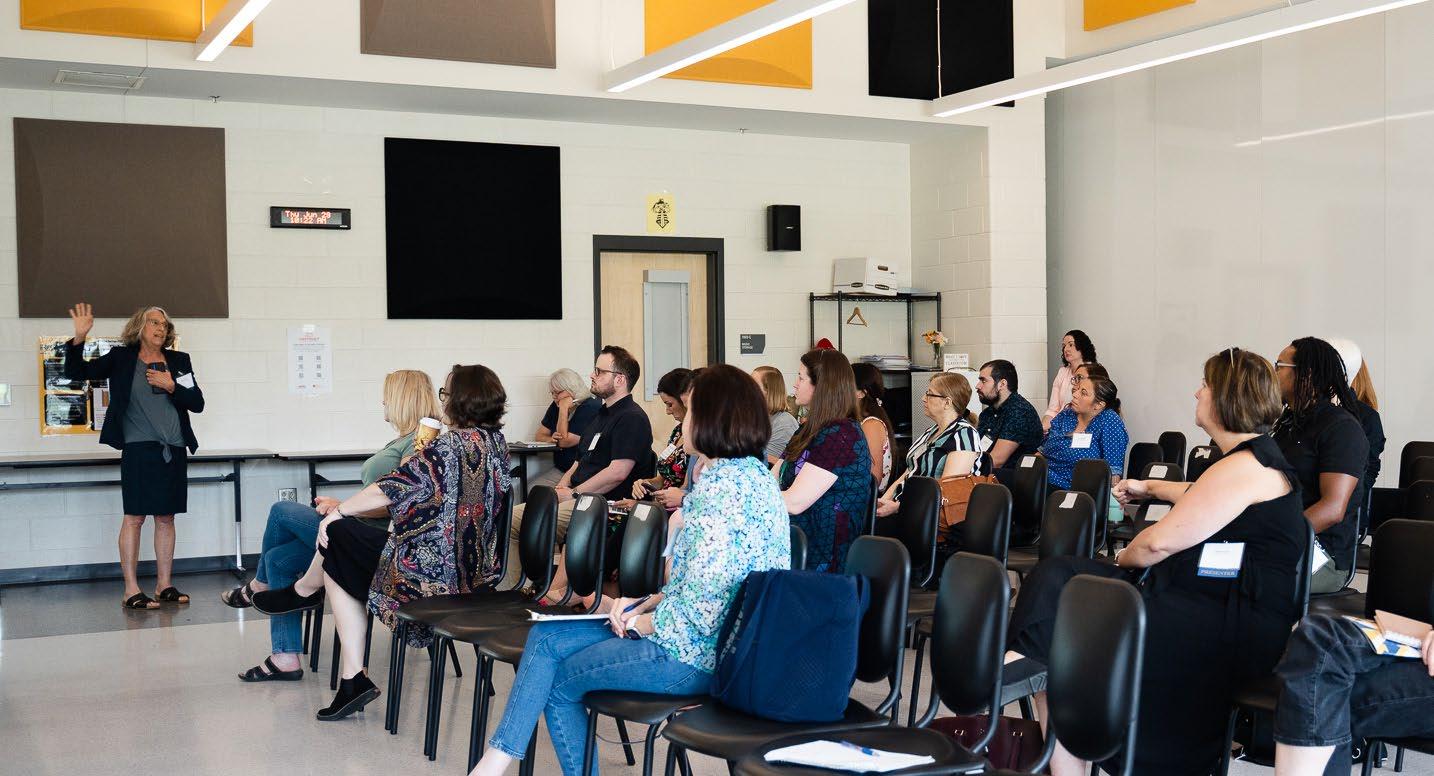
of the MERC advanced coursework participation report using VLDS data since publication in the fall of 2023
interactions with the MERC VLDS dashboard exploring advanced coursework participation in the MERC region
While there was a clear regional focus to the report and the dashboard, there were still state-level implications of the work given MERC’s usage of the VLDS to inform its analyses. Because of this, MERC researchers were invited to host a session at the VLDS Annual Research Forum in Short Pump, VA in September to discuss its processes for requesting data through VLDS, cleaning and structuring the data for analysis, running inferential statistics for the regional
report, and building a dashboard for public interaction with the data. The session at the forum was well attended, including representatives from the state-level who were focused on crafting policies that promote equitable access to advanced coursework for all students in Virginia. Conversations between MERC researchers and those state leaders during the session centered on how the VLDS helped them to create resources intended to inform local decision-making but with clear state-wide implications. Additionally, MERC researchers were invited to lead a separate discussion at the VLDS Annual Forum with research directors from PK-12 school divisions across the state to describe our rationale for utilizing VLDS and ofer guidance for how they might consider incorporating it into their work to answer their own questions related to student outcomes, academic or otherwise.
This project not only reinforced the benefits of utilizing the VLDS for future MERC research studies, but also highlighted the potential benefits of sharing our processes more broadly across Virginia. These sessions at the VLDS Annual Forum helped position MERC as a thought leader in the state for using secondary data analysis to inform local policy and practice while minimizing the data burden on school division partners. In the future, MERC will not only continue to utilize the VLDS for research projects to help explore questions that are pertinent to its regional partners, it will also actively seek additional opportunities to contribute to statewide conversations about accessible strategies for research and data utilization.
Including discussions about peer review, data visualization, and navigating issues of equity in RPPs
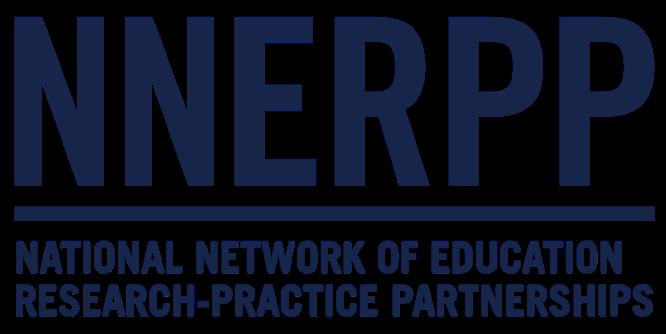
In 2022, MERC joined the National Network for Education Research Practice Partnerships (NNERPP), a professional learning community for RPPs (like MERC) across the country. Based out of the Kinder Institute for Urban Research at Rice University in Houston, NNERPP helps to facilitate conversations about RPP processes and convene university and PK-12 partners alike to generate resources that help move the field forward. Since joining, MERC has been deeply connected with NNERPP in a number of ways, not only to inform its own work but also to help lead collaborative eforts around key issues and common practices within the RPP community.
ICRE Executive Director Jesse Senechal serves on the NNEPRP Steering Committee, consulting on NNERPP initiatives and events. He also traveled to Houston, TX with Tifany Hinton from Henrico County Public Schools in the fall, and Matt Caratachea from Goochland County Public Schools in the winter to participate in “design sprint” eforts to develop protocols for NNERPP coaching and peer learning networks. MERC Director David Naf served as a Co-Chair of the University Brokers Subnetwork in NNERPP, a group with members across the country focused on establishing best practices in facilitating productive collaborations across university and PK-12 partners.
Additionally, MERC researchers led multiple professional learning sessions for NNERPP in the past year, including two “brown bag” discussions focused on developing an equity framework for RPPs. Additionally, MERC researchers led three sessions at the NNERPP Annual Forum in Houston in July, which centered on data visualization, peer review processes within RPPs, and navigating “asymmetric vulnerability” within partnerships through shifting sociopolitical contexts.
MERC researchers continued to build from these sessions at the Annual Forum to lead subsequent discussions about peer review within the NNERPP community and solicited chapters from researchers and practitioners across the country for an edited volume focused on how RPPs navigate issues of equity, both within their partnership as well as in the design of their research. That book is scheduled to be published in the fall of 2024. As one of the longest standing education research-practice partnerships in the country, MERC is positioned to be a thought leader in the field, and will continue to work with and learn from other RPPs in the NNERPP community for years to come.
The new institute provides research and evaluation support for education and community partners
In 2023, the Metropolitan Educational Research Consortium (MERC) expanded its reach and impact with the establishment of the Institute for Collaborative Research and Evaluation (ICRE). Building upon the success of MERC's regional partnership, ICRE serves as an umbrella institute that encompasses MERC's work and extends its collaborative evaluation and research projects to areas outside the Richmond region and beyond the K-12 education space.
Led by Executive Director (and former MERC Director) Jesse Senechal, ICRE ofers flexible and wide-ranging research and evaluation services for nonprofit organizations, PK-12 school districts, state and local governmental agencies, and institutions of higher education. Its current projects span a diverse range of topics, including STEM education, university-based teacher residency models, teacher induction, career pathways and work-based learning, early childhood education, and artificial intelligence in K-12 education.
A notable example of ICRE's work is its evaluation of the Virginia Talent + Opportunity Partnership (V-TOP), a multi-sector initiative funded by the Commonwealth of Virginia to expand and develop work-based learning (WBL) opportunities through resources and a system of V-TOP regional collaboratives. Led by Amy Corning, this developmental evaluation is designed to clarify program goals, contribute to a program theory of change, identify data needs, and explore possibilities for impact evaluation. This mixed-methods evaluation led to a review of the literature on WBL, a model of the WBL
system, and case studies of several V-TOP regional collaboratives; these products/ deliverables all support the state’s eforts to enhance the quality of WBL experiences for Virginia's students and WBL hosting organizations, and to increase the number of high-quality opportunities available.
Another significant project is the evaluation of Virginia's Prenatal-to-Three Early Childhood Comprehensive Systems (ECCS) project, led by Paula Ogston-Nobile, Associate Director of ICRE. This five-year project is directed by the Virginia Department of Health and aims to build strong systems of care for the prenatal to three (P-3) population by focusing on strategies for building family leadership, improving communication and collaboration among P-3 system organizations, & enhancing the coordination of service delivery.
Co-led by Paula Ogston-Nobile and David Naf, ICRE and MERC are working with the Boys and Girls Club of Metro Richmond on a project to understand the post-pandemic needs and challenges of Richmond’s Public School students. Through this efort, MERC is producing a research and policy brief about out-of-school time providers in urban school settings in a post-COVID context, and ICRE is leading a needs assessment focused on understanding the current challenges of the Richmond Public Schools' community in relation to out-ofschool time; the needs assessment involves the collection and analyses of qualitative and quantitative data from multiple stakeholder groups, covering a range of topics. An overall aim is to develop a tool for meaningful outof-school time programming that meets both school- and classroom-level challenges while responding to the needs and interests of

research and evaluation partnerships led by ICRE in 2023-2024 13
students and their families. Additionally, MERC will host a Summit session and seminar and record a podcast episode with the Boys and Girls Club of Metro Richmond to share what we learned from this project.
As ICRE continues to grow and evolve, it remains committed to its mission of fostering collaborative research and evaluation that positively impacts education and human services across Virginia and beyond. In the coming year, ICRE will expand its professional learning sessions with the goal of building our community’s capacity for collaborative research and evaluation eforts. By leveraging the expertise of its team members and the strength of its partnerships, ICRE is well-positioned to address the diverse needs of the communities it serves and to drive meaningful change in the years to come.
$700K
in external funding secured by ICRE in 2023-2024
The survey helped capture the emotional and professional capacity of PK-12 faculty and staf to meet student mental health needs
In 2021, MERC school division partners commissioned a study on supporting mental health in schools, recognizing the unique social and emotional challenges that the COVID-19 pandemic would bring to students and staf alike. The impacts of the pandemic on the mental health of PK12 students are well-documented, as are the impacts on faculty and staf. Additionally, research prior to the pandemic suggested that teachers often feel a sense of personal and professional responsibility to support the mental health needs of their students, but do not always feel equipped to do so. Based on this evidence, and the rising need for mental health support in schools, MERC researchers partnered with local school divisions to develop a survey that focused on the emotional and professional capacity of local PK-12 faculty and staf to meet the mental health needs of their students. This included asking them how they perceived their own mental health (and the mental health of their colleagues), how they perceived the mental health of their students, and how prepared they felt to meet student mental health needs. For employees who had been in their position for the past four years, there was also an interest in understanding how they perceived the impacts of COVID on each of these mental health outcomes.
To design a survey that was rigorous as well as applicable to the local context of Richmond-area schools, MERC researchers partnered with two doctoral students and one faculty member from the VCU School of Education to begin identifying relevant survey items from the peer reviewed research literature. This allowed MERC to approach this survey efort in a way that was methodologically sound before sharing the potential items with school division partners for review. MERC school
divisions collaborated with MERC researchers on multiple occasions to review and provide feedback on the survey items, including members of the mental health study team, the Steering Committee, and the Policy and Planning Council. This process took over a year to complete, with the goal of ensuring that the final survey not only contained items that were valid and reliable, but that the focus areas resonated with local school contexts and provided MERC partners with unique data to help inform their policy and practice decisions related to mental health support.
MERC administered the survey in three divisions in the fall semester of 2023 and spring semester of 2024, ultimately collecting over 1,000 responses. Following data collection, MERC then met with leaders of mental health support services in the participating school divisions to share emergent findings prior to the publication of the regional report and dashboard in the fall of 2024. These conversations highlighted how responses to the thoroughly-vetted survey items varied based on diferent roles within MERC division schools, particularly administrators, school-based mental health providers, and teachers. Because of the work that MERC researchers and school division partners put into developing the survey ahead of administration, they could be confident that it accurately reflected local needs, and by extension, illuminated practical paths for data-informed mental health support.
I really appreciate the work MERC does in that it provides a trustworthy foundation for a lot of my work…Since I've worked with MERC frsthand, I know the effort that goes into the resources, and I know I can trust the products.
- Central Offce Leader
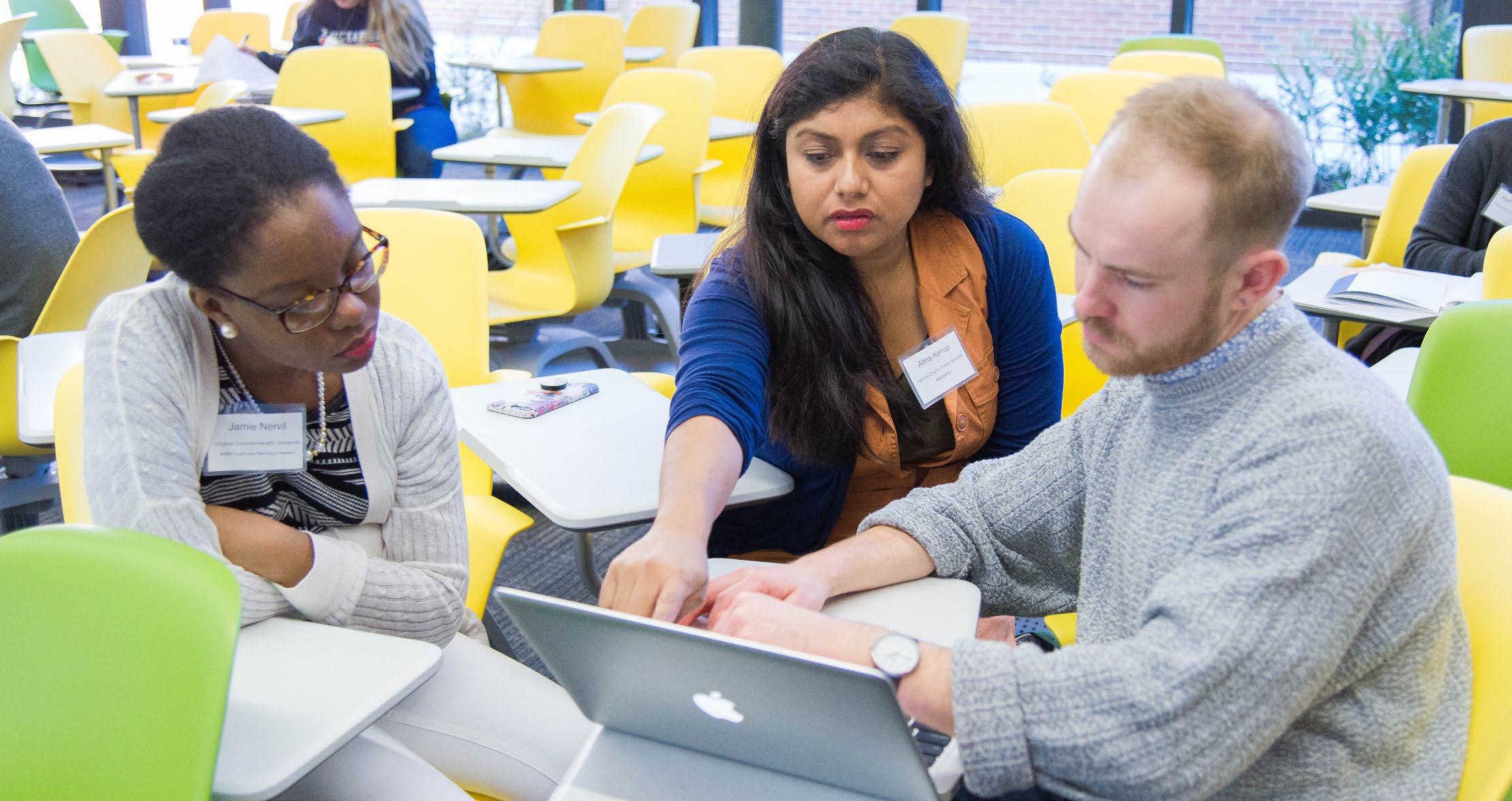
The graduating seniors ofered a vision for the future of educational research, policy, and practice
The MERC Summit has often featured the perspectives of PK-12 students to ensure that their voices are represented in conversations connecting research, policy, and practice in public education. At the 2023 event, MERC invited one graduate from each MERC school division to serve on a panel at the end of the day to reflect on their experiences (particularly over the past four years), and to ofer some direction to the stakeholders in attendance about what they should consider in their work moving forward. Participating students this year included Patterson Summers from Midlothian High School in Chesterfield County Public Schools, Anna Fowler from Goochland High School in Goochland County Public Schools, Funmi Adepegba from Hermitage High School in Henrico County Public Schools, Charlotte Costic from Mechanicsville High School in Hanover County Public Schools, and Tuchili Juan Pierce from Armstrong High School in Richmond Public Schools. Dr. Jeremy Raley, Chief of Staf for the Virginia Department of Education served as the moderator for the panel.
During the session, student panelists shared their earliest recollections of the pandemic and its impact on their schooling, the biggest changes they had noticed in public education since their freshman year, which aspects of their high school experiences were most beneficial in preparing them for the future, how they anticipated artificial intelligence and other emerging technologies to impact the experiences of future PK-12 students, what they thought distinguished the class of 2023 from previous classes, what guidance they would ofer the class of 2027, and what advice they had for the stakeholders gathered at the MERC Summit that day. They ofered their honest perspectives on their challenges and triumphs over the past four years, as well as their vision for the future of public schools. Attendees at the Summit frequently remarked on how powerful the student panel was on their overall experiences that day, including how the feedback that they shared would inform their work moving forward. Said one PK-12 school leader in attendance, “After hearing the panel, a focus on instructional practices in classrooms and how school, division, and state leaders can support the direct work being done by the Commonwealth's extraordinary educators. We heard examples from the panelists and graduates that were inspiring.” Said one PK-12 teacher in attendance, the impact of student voice extended to all youth who presented at the event, “The graduating seniors who presented in the breakouts and at the closing panel were fantastic!”
In subsequent years of the MERC Summit, the intentional inclusion of PK-12 student voices will continue to be a priority, and the student panel component will be moved earlier in the day to help provide a framework for discussions happening at breakout sessions throughout the event. The importance of this was captured in a quote from a PK-12 student presenter at last year’s Summit, “There were multiple open-minded conversations that had great value from multiple perspectives and there was a great open-minded environment where we could all speak our truth.”
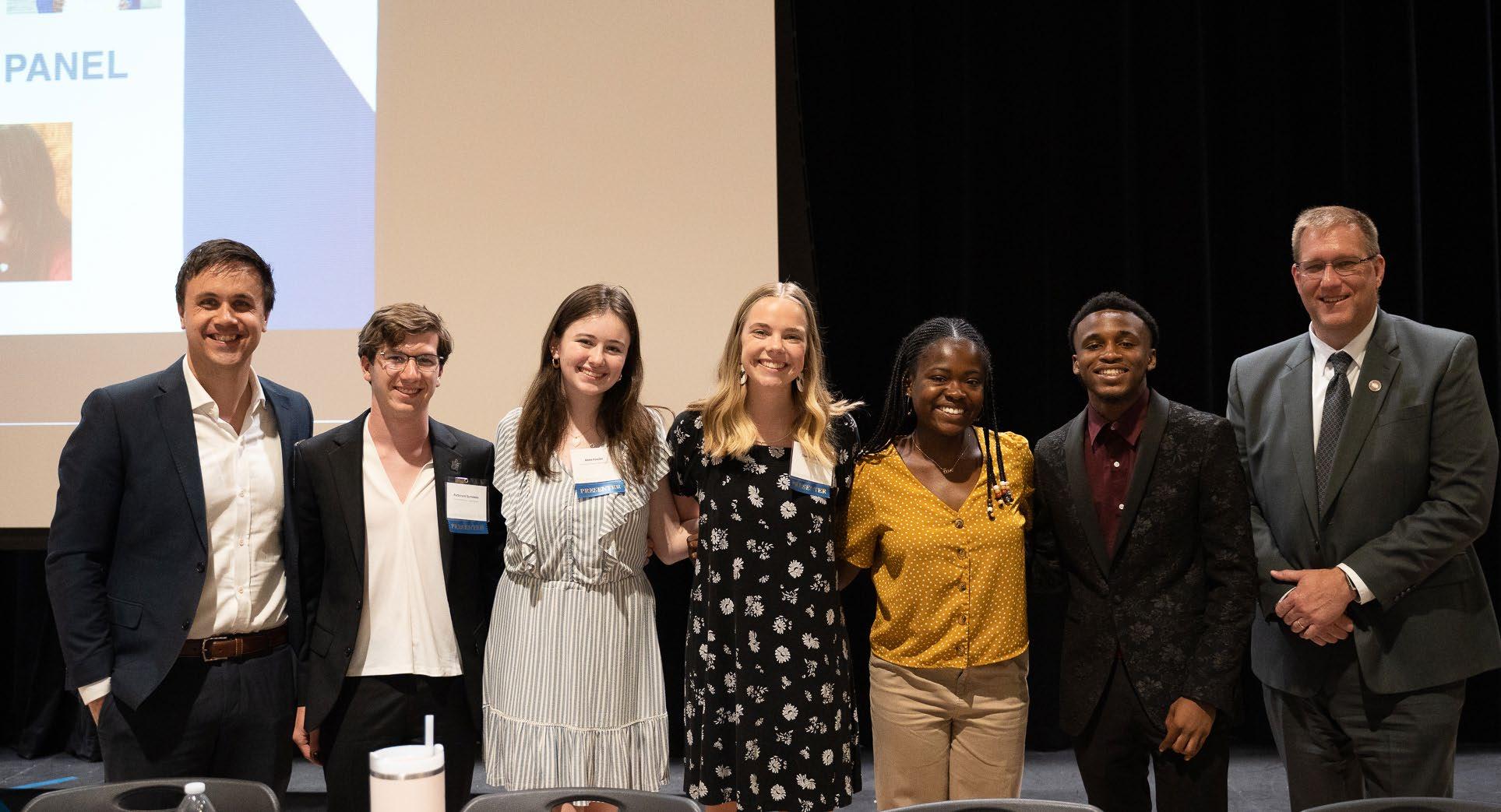
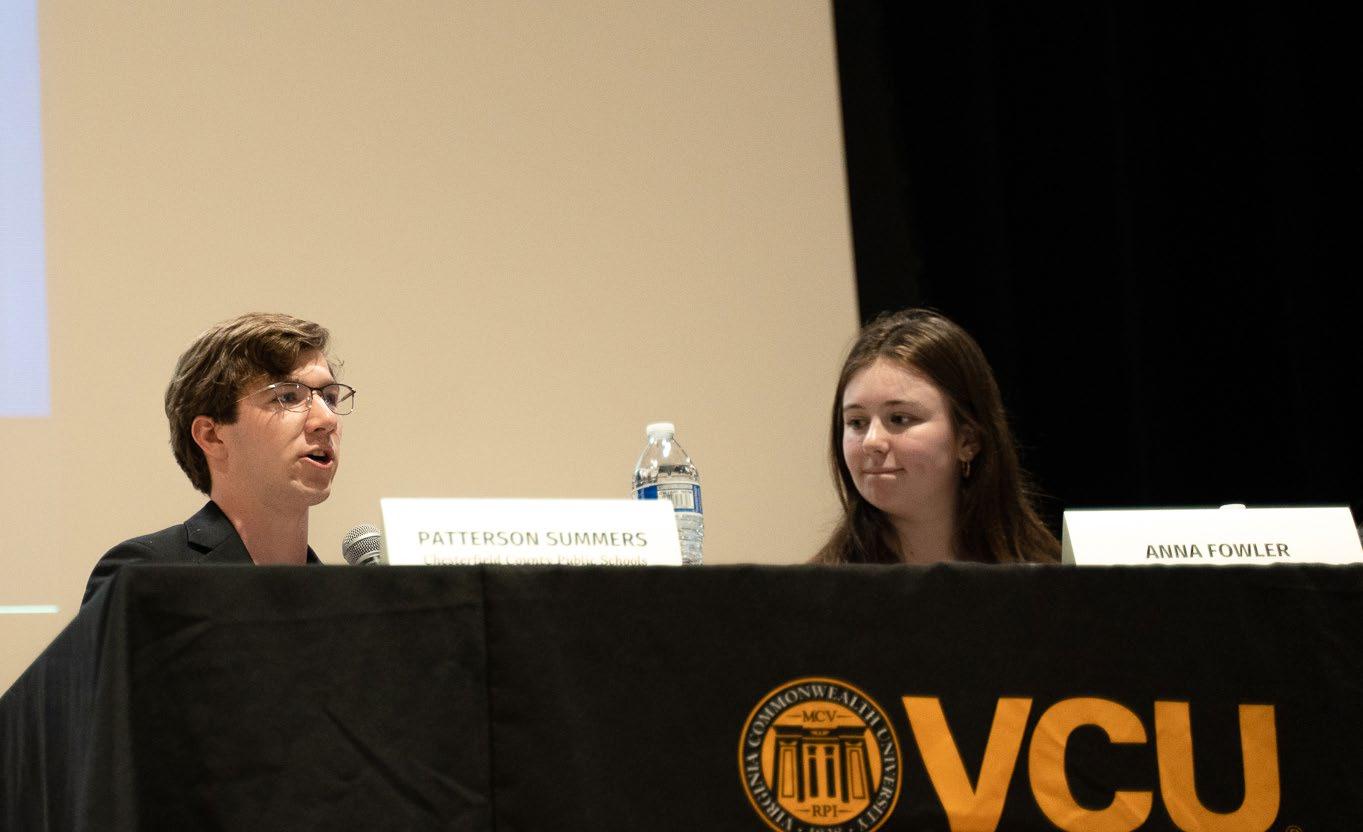
The content was extraordinary and inspiring but the opportunity to network with other researchers, practitioners, and policy makers was invaluable. However, the highlight of the Summit was by far, the panel of fve graduates to end the summit.
- School Leader
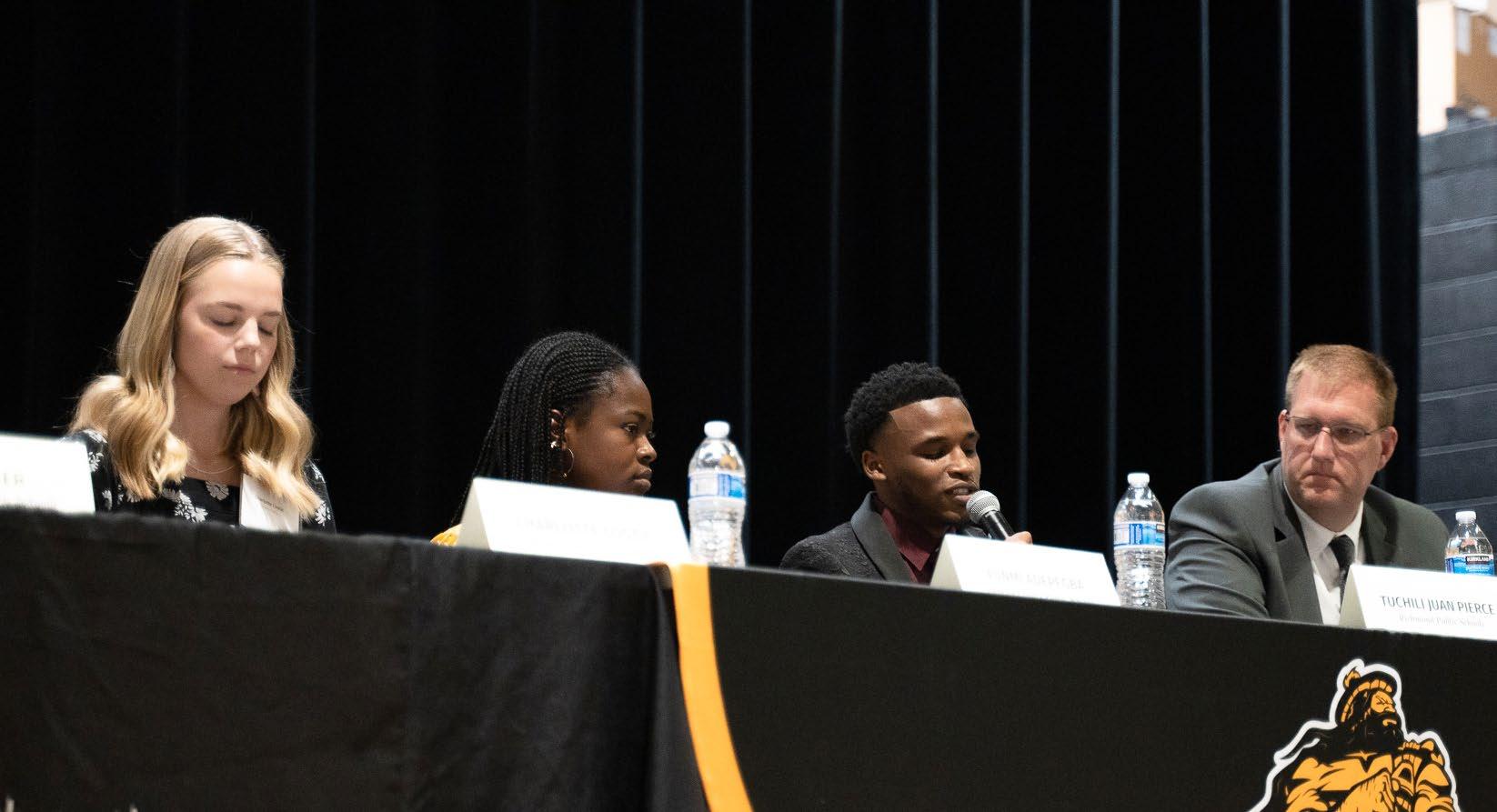
Seminars covered pertinent topics in PK-12 education while highlighting the perspectives of division and state partners

for the first annual MERC Back to School Seminar Series
To kick of the 2023-2024 academic year, MERC hosted its first annual Back to School Seminar Series over Zoom, an opportunity to not only share MERC research with a practitioner audience but also to highlight examples of relevant work and policy at the state and division level. This year’s seminar series focused on preventing bullying, suicide, and chronic absenteeism, all in a postCOVID context. The seminars summarized key highlights from MERC’s analysis of research literature, data trends, and relevant policies on each of these topics, and videos of all three seminars were posted to MERC’s YouTube channel for anyone who was unable to attend but still wanted to engage with the information. All participants received a certificate for 1.5 contact hours to be used towards professional development credit for their participation.
In total, there were 284 registrants for the MERC Back to School Seminar Series, and 97% of attendees indicated that they were likely to share what they learned with a colleague. Importantly, in addition to summarizing MERC research, each seminar highlighted the perspectives of practitioners and policymakers from the school division and state level to discuss the applications and implications of the research for everyday practice in PK-12 school systems. The seminar focused on bullying prevention (hosted in October during Bullying Awareness and Prevention Month) featured Sarah Bazemore, School Counseling Specialist for the Virginia Department of Education, Brian Maltby, Disciplinary Hearing Review Ofcer from Hanover County Public Schools, and Lisa Winn, Positive Behavior Support Coordinator from Hanover County Public Schools. Said one attendee, “I appreciate knowing that VDOE and Richmond area schools are aware and finding ways to address bullying in schools.”
The seminar focused on chronic absenteeism featured Alex Javna, Student Services Specialist for the Virginia Department of Education who shared state-level resources to help schools promote regular attendance and prepare for accreditation standards returning to pre-pandemic expectations for chronic absenteeism rates below 10%. Finally, the seminar focused on suicide prevention at the division policy level featured Chloe Carter, Chesterfield Youth Community Outreach Coordinator, and Justin Wallace, Suicide Prevention Coordinator for the Virginia Department of Health. Justin shared about state-level resources and priorities related to youth suicide prevention.
96.6%
diferent stakeholders from research, policy, and practice were featured in the series last year
of PK-12 partners and 100% of VCU partners agreed or strongly agreed that MERC communicates research in ways that support a better understanding of the topics for those working in PK12 education.
55.6%
of MERC PK-12 stakeholders engaged with MERC last year through a seminar
I plan to implement the methods of identifying and preventing suicidal ideations in adolescents daily. I have already begun to embed social and emotional check-ins with my students to encourage them to share how they are feeling beyond the surface.
Absenteeism is not just an issue at my school. I loved some of the suggestions for acknowledging students who actually make an effort every day to come to school. So often, we overlook those who are already doing what they they should.
Said one attendee, “Some of the key takeaways that resonated with me include the roles VDH plays in suicide prevention for individuals between 10 and 24, methods to identify students struggling with mental health challenges and suicidal ideations, and ways I can help prevent suicide in our school and beyond.” Chloe shared about the inaugural Teen Summit RVA, which focused on supporting the mental health needs (among other pertinent needs) for Richmond-area youth. Said one attendee, “I enjoyed learning about the Teen Summit opportunities for students. Students being encouraged to share their voices on current trends and ideas that efect them and their peers.” MERC hosted both of these seminars in September, which was both Suicide Awareness and Prevention Month and Attendance Awareness Month.
While these seminars ofer a clear opportunity for communicating MERC research using methods that help to maximize its potential use in schools, they are also a platform for highlighting diferent perspectives on key topics that are of immediate relevance to local educators as they prepare for the new school year. MERC plans on continuing to host this series on an annual basis.
100% of attendees were somewhat or highly likely to recommend a MERC seminar to a colleague
•
•
• • I also appreciate knowing that VDOE and Richmond area schools are aware and finding ways to address bullying in schools.
Some of the key takeaways that resonated with me include the roles VDH plays in suicide prevention for individuals between 10 and 24, methods to identify students struggling with mental health challenges and suicidal ideations, and ways I can help prevent suicide in our school and beyond.
I enjoyed learning about the Teen Summit opportunities for students. Students being encouraged to share their voices on current trends and ideas that efect them and their peers.
From a research method perspective, I was interested to learn about the Google trends. From an educational policy perspective, it is helpful to be able to see the big picture and how my professional practice may fit with larger needs and intiatives.
The meetings were an opportunity to reflect on the previous year and maximize the potential benefit of MERC research in the year ahead
MERC routinely engages with its school division partners throughout each academic year. This occurs through meetings with study teams associated with each of its research projects, quarterly convenings of the MERC Policy and Planning Council to share study updates and engage in shared governance of the consortium, collaboration with the MERC Steering Committee related to diferent research components (e.g. data collection), and small group discussions
with stakeholders in each school division who have a vested interest in MERC research findings. While these points of connection have long been foundational to building and maintaining relationships with each of the five MERC school divisions, MERC leaders recently began engaging in individual discussions with each member division to kick of the academic year.
These meetings ofered the opportunity for MERC researchers to sit down with leadership in each school division to reflect on MERC’s research and dissemination activities over the past school year, including projects of specific interest to each division and evidence of their local impact. Additionally, these meetings were an opportunity to confirm research plans for the year ahead and to engage in discussions about how MERC could maximize its benefit to each division. This included questions such as “What were the main benefits to your school division in 2022-2023 of MERC membership?", "How could MERC better serve the needs of your school division in 2023-2024?",
"What are some potential research brief topics of interest to your school division this year?", and "How else would you like for us to engage with your division in the upcoming academic year?". The information gathered from these discussions not only helped to inform the work of MERC in the 2023-2024 academic year, but it also helped to strengthen relationships with member school divisions by beginning the year in conversation about meeting their most pressing needs through research. MERC will continue to engage in these individual school division outreach meetings in the years ahead in order to ensure that its research profile remains attentive to the current priorities of its partners.
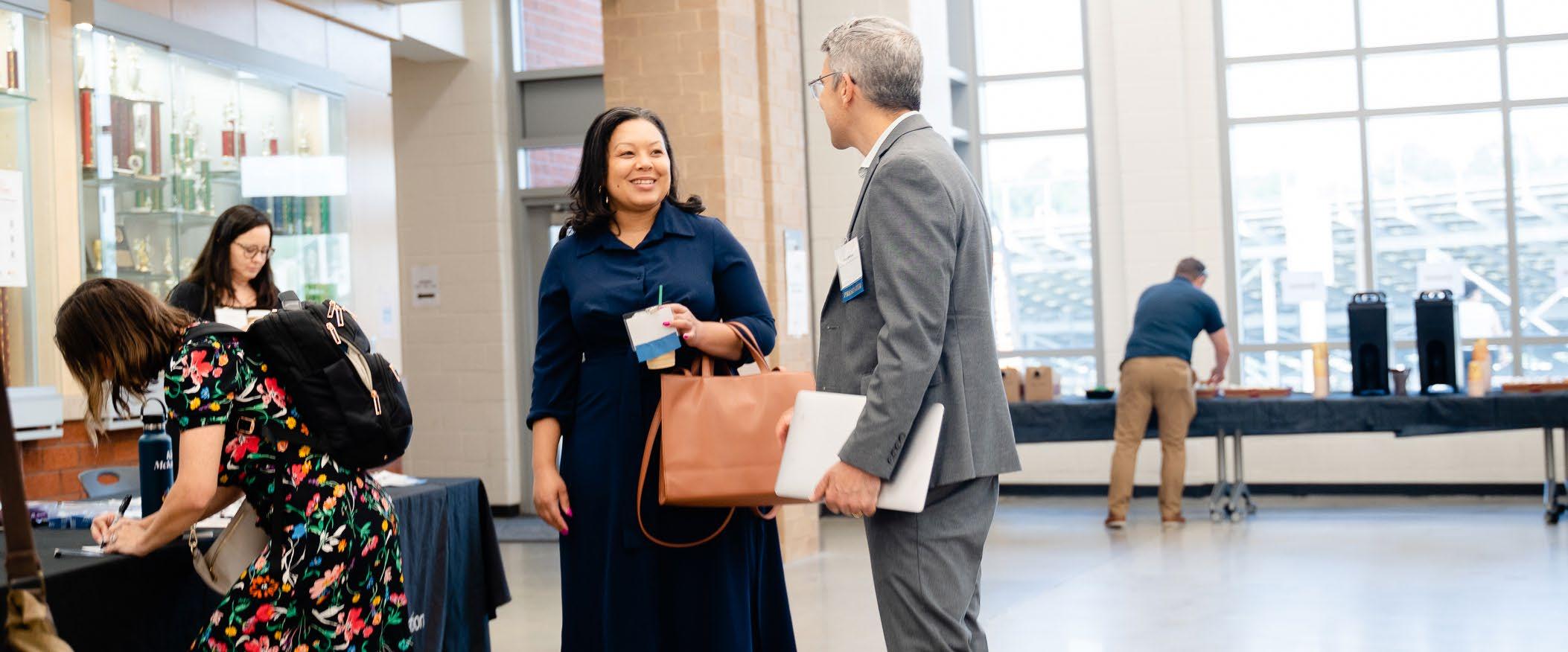
44%
of MERC PK-12 stakeholders utilized MERC research to inform school improvement eforts
76%
of MERC PK-12 stakeholders utilized MERC research to inform conversations within their team, department, or unit
As this annual report has illustrated, MERC has been deeply invested in supporting the work of our school division partners by brokering connections across educational research, policy, and practice. However, there is undoubtedly room to grow and improve, and we remain committed (and excited) to evolve our practices to maximize the impact of our research. This concluding section of our report ofers an overview of our commitment moving forward, informed by our eforts over previous years of our partnership as well as feedback we have received from our stakeholders through our annual survey and other methods previously outlined.
Survey teachers in the areas to fnd out what they want to be researched. I don't feel that teachers are the direct consultants, benefactors or recipients of MERC's research opportunities.
Each year, MERC asks its stakeholders to indicate how familiar people are with MERC. This year, only 61.5% of respondents overall indicated that people in their school, university, or division were familiar with MERC, which was true of 66.7% of respondents from partnering school divisions. While this is a meaningful increase of 51.7% of stakeholders in 2022-2023 reporting familiarity about MERC within their institutions, there is still a clear opportunity to increase MERC’s visibility with people who are able to best apply its research towards their work. Recent strategies in this area have included moving the MERC Summit from the fall to the summer to allow more school building-level personnel to attend, inviting more school division partners to serve as co-authors on reports, reworking our study team meeting structure to be more accommodating of schedules of team members working in PK-12 school buildings, and engaging in direct outreach to anyone interested in MERC research and resources through our email listserv (currently at 2,000 members). In addition to continuing to leverage these strategies, we will also work to communicate findings in more succinct ways (e.g. producing infographics that are easily distributed and discussed within school settings). Additionally, we will collaborate with school divisions to invite input from school building-level leaders and practitioners on the direction of the new MERC study that will launch in early 2025.
I think creating consulting sessions for current instructors (faculty and adjuncts), around MERC topics that directly align with specifc SOE courses could help integrate MERC studies and research into current curriculum.
In the past academic year, MERC accelerated its eforts to onboard VCU students (primarily PhD and EdD) onto its research and evaluation projects as data analysts as well as co-authors on reports. While some students received course credit through their participation (e.g. as an externship, guided research, or independent study), the vast majority of students participated in a “co-curricular” capacity, meaning they did not receive a course credit but did satisfy programmatic requirements to engage with research outside of their coursework. For many students, this may still be the most beneficial way for them to engage with MERC. However, in the upcoming academic year, MERC leaders will establish an infrastructure for helping students receive course credit through their participation on our projects if it would help support their pathways towards graduation. This could prove particularly beneficial for undergraduate and masters students participating in MERC research, and would be consistent with research on the benefits of workbased learning that also satisfies course requirements for participating students. Additionally, we will collaborate with VCU faculty to explore strategies for integrating our research into their syllabi and instructional materials.

MERC researchers have led conversations at VCU and in the metropolitan Richmond area about the risks and benefits of artificial intelligence (AI) large language models in education. While the potential impacts of AI on teaching and learning for both PK-12 and higher education are becoming increasingly clear, there are also significant considerations for how to thoughtfully integrate this new technology into research methods, including the potential ethical implications of its use. To ensure that MERC is intentional about utilizing AI in its work to maximize its potential benefits to partnering school divisions seeking cutting-edge research, we will also engage in ongoing conversations within the broader ICRE team (as well as with VCU and division partners) about how to do so ethically while protecting the data and confidentiality of participants as well as the integrity of our methods.
Target more the students in school who will be the teachers and administrators of tomorrow …Sometimes students listen more to their peers.
The inclusion of PK-12 student perspectives at the annual MERC Summit, as well as in some action researchbased projects that MERC has led in recent years, have been helpful in integrating their voices into our work, which ultimately intends to benefit them. Still, there are opportunities for being more intentional about integrating PK-12 student voices into MERC research and resources that we will continue to explore. Some examples include the expansion of MERC research teams to invite PK-12 students from MERC divisions to get involved (e.g. through internships or class projects), pursuing national grants related to promoting youth voice in RPPs through the National Network of Education Research Practice Partnerships (NNERPP), extending an ofer to local PK-12 students to attend the NNERPP Annual Forum for free when we co-host the event in Richmond in July of 2024, and engaging in more intentional outreach to encourage submissions to our annual Summit that feature collaborations with PK-12 students. Incorporating additional student perspective into our work will help to increase its credibility and maximize its potential impact on youth outcomes in our region.
- VCU StudentI would love to see MERC conduct school based professional development.
MERC’s recent dissemination eforts have included strategies that focus on professional learning, such as Zoom seminars that are ofered for free for PK-12 and VCU partners alike. While feedback from our stakeholders suggests that these eforts have been well-received and have encouraged participants to share what they have learned with colleagues to apply the research to their practice, there are additional eforts that MERC could engage in related to professional learning. This includes presenting at school division-level conferences, trainings, and events (as invited) to share research findings with stakeholder groups who would find them particularly pertinent to their work. Additionally, MERC will explore ofering microcredentials that ofer professional development credit to partners who systematically engage with our research and resources in ways that inform their practice.
MERC could increase impact by reaching out to other school systems who could beneft from the work being done in the Richmond local area such as working in surrounding and other rural areas in the commonwealth.
Although MERC’s research eforts prioritize engagement at the local level to ensure that we are meeting the needs of our school division partners as well as VCU students, staf, and faculty, we increased our eforts in the past academic year to engage in conversations pertinent to state and national audiences. This included our involvement through the VLDS at the state level as well as NNERPP at the national level. Given the long standing nature of our partnership and our commitment to continue to grow and reflect on our practice, MERC has the potential to serve as a thought leader on research-practice partnerships. In the upcoming year, we will continue to seek opportunities to partner with state agencies, including the Virginia Department of Education and Virginia Department of Health, when our work is of interest to stakeholders across the Commonwealth. Additionally, we will consult on emerging partnerships across Virginia and the country who are interested in establishing meaningful collaborations centered on research. We will also explore opportunities to engage with national, nonpartisan organizations and think tanks that support the mission of public education. Finally, MERC will continue to explore opportunities to partner with other school divisions in Superintendent's Region One of Virginia, as recommended by our recent strategic planning eforts with current MERC divisions.
